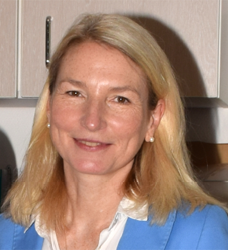Prof. Dr. rer. nat. Monika Brunner-Weinzierl
 |
Prof. Dr. Brunner-Weinzierl studied Biology and Computer Science at the FU Berlin, where she also received her doctorate. After her postdoc at the University of California at Berkeley, she completed her habilitation in 2003 in the field of Immunology at the Charité Berlin. Today she is the head of the Department of Experimental Pediatrics and Neonatology at the Children's Hospital of the Otto von Guericke University Magdeburg and her research focuses on the deactivation of immune responses. She is also the first female Vice Rector for Research, Technology and Equal Opportunities at the OVGU. Motto: Just do it. |
Career
|
Education: |
1985-1991 |
Diploma degree in Biology, FU Berlin |
|
|
1986-1988 |
Studies of Computer Science, FU Berlin |
|
Doctorate: |
Mär 1995 |
FU Berlin |
|
Habilitation: |
Nov 2003 |
in the field of Immunology, |
|
Work: |
1991-1995 |
Research assistant at the German Rheumatism Research Center Berlin |
|
1995-1997 |
Postdoc at the University of California, Berkeley, USA |
|
|
1997-2002 |
Group leader at the German Rheumatism Research Center Berlin |
|
|
2002-2007 |
Group leader at the Clinic for Internal Medicine, Charité Berlin |
|
|
since 2007 |
Head of the Department of Experimental Pediatrics and Neonatology at the University Children's Hospital, Medical Faculty, OVGU |
|
|
2016 - 2020 |
Pro-Rector for Research, Technology and Equal Opportunities, OVGU |
|
|
2020-2022 |
Coordinator of a BMBF collective project in the program COVID-19 |
I basically wanted to understand the mechanisms of life. From a very early age I was fascinated by how it is possible for beings to live, eat, reproduce or just lie lazily in the sun. Ultimately, I ended up with the immune system. The challenges to the immune system to clearly identify and fight off pathogens, and to leave the body's own tissue intact at the same time, impress me very much. And although we are constantly discovering new mechanisms, nothing seems to be fully understood. Immunology is a very fast subject and when I dive into the literature database I lose track of time.
Motivation
I love thinking about the unresolved questions of science and looking at physiological processes from new perspectives. First comes the detailed research and then I put the pieces of knowledge back together like a puzzle. The hypothesis must then be proven as cleverly as possible. The discussion around it is extremely interesting, and I really like this challenge.
I enjoy working as the Vice Rector for Research, Technology and Equal Opportunities in improving the university’s self-administration. Participating and making decisions that make a difference, making our university more modern and the world a better place, I like that very much.
Requirements
In research you should be open and vigilant and always be able to pick up new impulses. Research never stands still. You have to keep learning and I think it should almost be like a hobby. If you enjoy it, you've come to the right place and will have a lot of fun. Persistence is also important, research is often competitive and you have to have the bite to fight your way through. In order to achieve this, collaboration and exchange with others are essential. You should also have fun with this social component.
Advice
Sometimes you get ahead if you think unconventionally or even contrarily. A good example of this is allergen immunotherapy. It can be done with by hypo-sensitization or hyper-sensitization and in both cases the therapy is successful.
It is advisable to find a mentor for your career. Good advice is worth a lot. You should also look at personnel management as early as possible and not neglect acquiring soft skills.
One should never forget that research thrives on diversity and that your personal perspective is a valuable asset.
Challenges
I've learned that if something goes wrong in your career, you should look ahead immediately and have a plan B ready. Ultimately, the most important thing is to be very good in your area of expertise and not get too lost in feeling mistreated. Nevertheless, it is important to create better conditions for the next generation whenever possible. I specifically decided to take on the post of Vice-Rector in order to act as a role model for younger female scientists. No woman had filled this post before me. It is also important that role models do not have to be perfect, but primarily exist. Because if there is already a woman in a position, it is easier to imagine holding that position yourself as a young woman.

